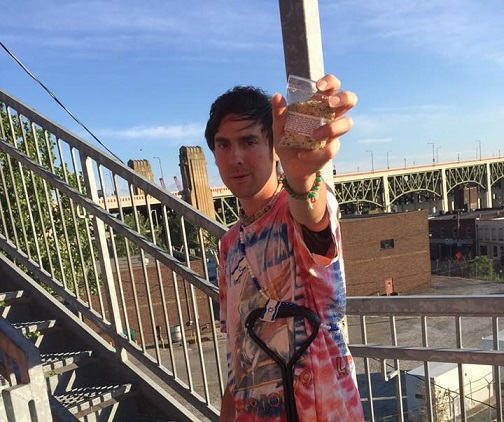by Michell Spoden
Healthy food and natural healing remain a major choice for many health-conscious people. Today my guest comes from the same field. Mr. Jeremy Koosed, a 33-year-old American of Jewish Eastern European heritage, runs Plant Kingdom Snackery in Akron, Ohio, working the position of manager and a leader in his nutritional wellness advocacy initiative.

Michell: Jeremy, please share with our readers a little about your business.
Jeremy Koosed: My snack foods line came about seeing a need for expanded vegan protein options. We make dehydrated protein bars stuck together with nut butters and sticker sweeteners. Our most popular is a “pleasantly crispy” coconut chocolate bar. Goo balls are our most popular no-bake snack. We also stock superfood chia seeds and cacao nibs to encourage people to make their own energy snacks. There’s Ohio-made specialty botanical products like herbal tea mixes and hemp body care. We stock all variety of hemp seed foods at our Snackery storefront along Mayfield Rd in Lyndhurst. Our hemp foods come in bulk from Canada and we can offer great deals.
Michell: Why Hemp?
Jeremy Koosed: Hemp is one of the natural wonders of the world, an asset to our continued survival. The nutritional profile of the shelled hemp seed is what makes our snacks so strengthening and satisfying. I wanted to take the initiative to confront stigma and misunderstanding around the crop, and give people a chance to experience the seed food. My physiology is really aligned with Hemp, as this is traditionally the foodstuff of peasant classes and my ancestry is from the hinterlands of Eastern Europe where Hemp is basic, like American Apple pies. It’s an honor to promote something so glorious and we do hope our efforts have improved people’s quality of life. I’ve been a Hemp fanatic since 1999 when I found out how environmentally sustainable the crop is. It comes like second nature to me to represent our seedy snacks line, because I have been following Hemp and agriculture issues closely through my adult life.
Michell: Please share a bit about your hemp advocacy work.
Jeremy Koosed: My Hemp work took a turn for the serious when we started acting on the nutritional science around Omega-3s. I have been promoting the protein aspect for a long time for ethical and sustainability reasons. But with the Omega-3 fat balance showing the negative effects of Omega-3s deficiency, this has become a major human health resiliency concern because some Omega-3s and Fat-balancing dietary habits are shown to prevent mental health disorders. So I launched Omega Fats Action Network in 2014 as a pro-plant response to Omega-3 deficiency to promote the functionality and access to super-seeds, including hemp flax and chia. We have developed a comprehensive spate of reforms that we advocate for as independent health activists. Our Actonfats.com site has links to recipes, action toolkits for stopping overfishing and hemp farming advocacy, and action steps for reforming psych wards and police reform – areas I decided stand to benefit a lot from some brain-supportive nutritional wellness programming.
Michell: And you use actively social media in your advocacy?
Jeremy Koosed: Our twitter is active with appeals to celebrities, politicians, mental health professionals, academics and health NGOs, and environmental and oceans’ defender NGOs about the dangers of Overmedicating and overfishing.
Michell: Would you like some legal reforms to serve your cause?
Jeremy Koosed: Our Legislative priority is to pass the Hemp Farming Act of 2015. Ohio’s influential senators have ignored our grassroots appeals on the subject. This law is critical because it will remove federal barriers to commercial hemp production and importantly reduce stigma. It takes leadership to clear up the drug-war era lies around hemp and the unfounded fears people may have about failing a drug test. We want to get this out of the way so people feel comfortable about diversifying their diets with Hempseeds. But I am also cognizant to get over Hemp stigma, so that we can have this broader discussion about the effects of fat-intake. We have a “pass the buck” culture with regards to a lot of natural health things and especially cannabis. These shameful senators and US House Reps don’t want to be “stuck” legalizing so it’s really depriving America of a discussion around Healthy fats. Should Healthy fatty acid science inform policy, we think so! But that doesn’t mean anyone has been racing to help me.
We are also keep lobbying for our share of green jobs in the PTSD recovery by making pleas to mental health leaders in congress. Our plea for some time has been to “Fund Omega-3 education” and with the serious extent of head-trauma from PTS. This is the perfect time to be overtly supporting Omega3 fat balance strategy as a first line of defense for recovery vets who deserve to feel better. We are lobbying for this one and hope to get the Health Benefits of ALA Omega-3 before the Agriculture Committees.
Michell: Does your company or cause associate itself with any other causes?
Jeremy Koosed: In Addition to Omega-3 related health education/access, we support observance of Meat Free Monday and Factory Farm Free Friday. I co-wrote the Cleveland Meatless Monday Resolution, which stands as the most-agriculturally aware, pro-vegetarian resolution of its kind, although I wish someone would one-up us. We also want our snacks’ recipes given away and to find support for Omega-3s in food aid relief. We are trying to organize support for getting Omega-3 snacks and researching the Ukrainian Hemp seeds because Ukraine has 1B in USAID and what’s more of a lifeline than a healthy snack to the refugees displaces by conflict in Syria and Crimea. This has led me to reach out to Ukraine Caucus of the US House. I am in touch with national hemp groups about this.
Michell: Let’s talk about the taboos of hemp.
Jeremy Koosed: Giving away seed samples to kids who are under tween age is not a good idea if their parents are not around. This has come up at festivals, only a couple times, where a parent gets irate that their kid comes by with “paraphernalia” as far as they can derive. I’ve gotten “he’s only three” guilt from a dad and I just felt like I handled it wrong. The stigma is really about weed, not about Hemp. OFAN designers are produced about 25 placards in a “bring hemp back” series to destigmatize the non-drug crop. The placards are intended for photo-petitions and display for solidarity in windows and we have them all over our walls at the snackery. People inevitably welcome the seeds or, if they have any remarks about it, will say that they are ok with it or like it in some way. People believe me when I tell them about the benefits being a good thing. There’s really never been anyone so opposed to industrial hemp that they would argue with me that Hemp farmers in Canada should stop or that they agree with maintaining federal prohibition on commercial hemp production. It’s important if people are harboring taboos, to remind them about the healthy role Hemp can play in land use and resource, so people come to see it as an asset to our wellness and economic recovery instead of some queer botanical phenomenon. Protesting at medical installations is fairly a taboo, or may be uncomfortable at first. There’s just so much to take up with these health institutions given the gravity of safe access as a social justice issue.
Michell: Why hemp farming would be so beneficial?
Jeremy Koosed: Because cannabis products are beneficial to quality of life in so many way, Hemp needs overt diplomatic support to overturn regressive policy. We need heart-healthy plant proteins because of the depletion, water pollution, and animal cruelty done by big-ag. Put things in context, we need healthy land uses because GMOs, Round-up, and Fracking are so extensive. Functional recipes can restore our health and hemp farming has restorative benefits for the soil, and protects waterways as a buffer zone. And with this whole discussion, it’s important to keep in context we are only 3 to 4 generations removed from a time when hemp was grown and medical cannabis was the basis for 20% of pharmacopoeia. So while it’s important to catch up the general public on what’s going on, what activists like myself are saying is we are actually invested in relying on this and it’s an important competent of our natural lifestyle and we’re furious that our rights continue to be denied, as if policy is only informed by people who have nothing invested in whether or not they want it or need it. While we have to fight so many diseases, respond to a major nutritional deficiency of Omega-3 fats without any funders identified for our recipe promotions. And Hemp stigma is preventing mental health professionals from having a robust discussion on Omega-3s, doing a disservice to our brain cell membranes and overmedicating ADHD and depression.
Michell: Recently the nation voted on Issue 3 for the legalization of Marijuana in Ohio. What are your thoughts?
Jeremy Koosed: My thoughts are that the State Officials should be ashamed of themselves for Issue 2, the monopoly language. They may as well spit on the patients of the state. It’s the most distant from human compassion, to have to confront these prohibitionists who do not support safe access. I believe strongly that rights movements do not wait for our rights; we fight for them. And I’m not taking anyone seriously that does not have their own protest gatherings and grassroots campaigns to pressure the hospitals, mental boards, federal govt, and politicians. We need marches and cheers and songs and banner drop stunts. Gathering signatures is redundant. I feel awful to admit but we need more tactics going mainstream or else the cannabis community is not doing justice to the scale of urgent need.
Michell: Please share with our viewers your long-term personal goals.
Jeremy Koosed: To even the score and Save our Seas from Overfishing! Get gay marriage soon and turn my pro-plant cheers into Hyms. I would like to be a singer in a band and a comedian. I am planning a run for US Senator from Ohio.
About the Author
Michell Spoden is the author of Stricken Yet Crowned and is also pursuing a transitional housing project for woman with an agricultural aspect. She has a degree in Business Science Administration and is finishing her bachelor’s in Project Management.


